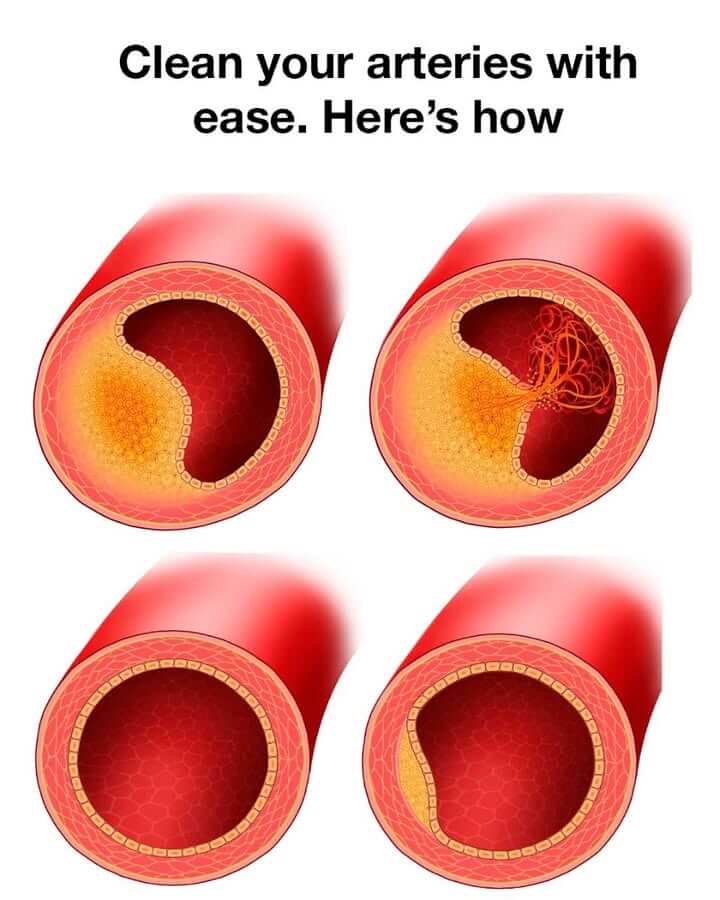Heart health plays a vital role in overall well-being, as cardiovascular disease continues to be one of the top causes of mortality across the globe. Arteries are responsible for transporting oxygen-rich blood from the heart throughout the body, and keeping these vessels free from plaque buildup is essential for proper circulation. Plaque, made up of fat, cholesterol, and other substances, can restrict or block arteries, potentially leading to heart attacks or strokes. To maintain clean arteries and a strong heart, it’s important to engage in regular physical activity and follow a diet centered around heart-friendly foods.
Understanding the Importance of a Heart-Healthy Diet
A diet that supports heart health focuses on foods that improve cardiovascular function and minimize plaque formation in the arteries. Typically, this type of diet limits saturated fats, trans fats, and dietary cholesterol while emphasizing fruits, vegetables, whole grains, lean proteins, and healthy fats. These nutrient-rich options contribute to lower blood pressure, reduced inflammation, and improved cholesterol profiles—key factors in supporting a healthy heart.
How Certain Foods Contribute to Arterial Health
Some foods offer specific benefits that directly support arterial health. They are often rich in antioxidants, dietary fiber, healthy fats, and other compounds that work synergistically to combat inflammation, lower harmful LDL cholesterol, and boost beneficial HDL cholesterol. By incorporating these options into your meals, you help your body naturally maintain clear and efficient arteries.
Avocados: The Heart-Healthy Fat
Avocados provide a generous amount of monounsaturated fats, which help lower bad cholesterol and reduce the risk of cardiovascular disease. They’re also packed with potassium, which supports healthy blood pressure levels. The fiber content in avocados contributes to improved cholesterol and supports weight control by promoting satiety.
Berries: Antioxidant Powerhouses
Blueberries, strawberries, raspberries, and other berries are full of antioxidants such as anthocyanins. These compounds help fight inflammation and oxidative stress, both of which can harm arteries. Berries are also known to help lower blood pressure and improve overall cardiovascular health.
Fatty Fish: Omega-3 Rich Choices
Fish like salmon, sardines, and mackerel are loaded with omega-3 fatty acids. These essential fats help decrease inflammation, lower triglycerides, and reduce the risk of irregular heartbeats. They also aid the production of nitric oxide, a compound that relaxes blood vessels and supports healthy circulation.
Nuts: A Crunchy Source of Healthy Fats
Nuts including almonds, walnuts, and pistachios are high in unsaturated fats, fiber, and plant sterols—all of which can help manage cholesterol levels. They also provide L-arginine, an amino acid that helps produce nitric oxide to support blood vessel flexibility and function. Eating nuts regularly has been linked to a lower risk of heart issues.
Olive Oil: The Mediterranean Elixir
Extra virgin olive oil, a key part of the Mediterranean diet, is celebrated for its high content of monounsaturated fats and polyphenols. These components provide anti-inflammatory and antioxidant benefits that support cholesterol balance and protect arteries from oxidative damage.
Whole Grains: Fiber for Heart Health
Oats, brown rice, quinoa, and other whole grains are rich in soluble fiber, which binds with cholesterol in the digestive tract and assists in its removal from the body. These grains also offer magnesium and B vitamins that contribute to healthy cardiovascular function.
Leafy Greens: Nutrient-Dense Choices
Leafy vegetables such as spinach, kale, and Swiss chard contain an abundance of vitamins, minerals, and antioxidants. They’re especially high in nitrates, which the body converts into nitric oxide—a compound that enhances blood flow. These greens are also low in calories and high in fiber, making them excellent for weight and heart management.
Tomatoes: Lycopene for Heart Protection
Tomatoes are packed with lycopene, an antioxidant that helps lower LDL cholesterol and combat inflammation. Lycopene supports arterial health by protecting blood vessels from oxidative stress. Regular consumption of tomatoes and tomato-based products is associated with a lower risk of heart disease.
Garlic: Nature’s Cholesterol Fighter
Garlic contains allicin, a compound shown to reduce blood pressure and cholesterol levels. It also offers anti-inflammatory and antioxidant effects, making it a great addition to a diet aimed at supporting artery and heart health.
Beans and Legumes: Protein and Fiber Combo
Legumes such as lentils, black beans, and chickpeas are rich in fiber and plant-based protein. The fiber helps reduce cholesterol while promoting satiety, which supports healthy weight. These foods also contain beneficial plant compounds and antioxidants that aid cardiovascular health.
Dark Chocolate: A Sweet Antioxidant Boost
Dark chocolate, particularly those with high cocoa content, offers flavonoids—antioxidants that can enhance circulation, reduce blood pressure, and prevent the oxidation of LDL cholesterol. When consumed in moderation, dark chocolate can be a heart-friendly treat that supports arterial function.
Conclusion: Building a Heart-Healthy Diet
Integrating these 12 foods into your daily meals can play a key role in keeping arteries clear and your heart protected. A balanced diet that includes fruits, vegetables, whole grains, lean proteins, and healthy fats supports optimal cardiovascular health. In addition to dietary choices, maintaining regular physical activity, managing stress, and avoiding smoking are essential practices for a healthy heart and overall well-being.
